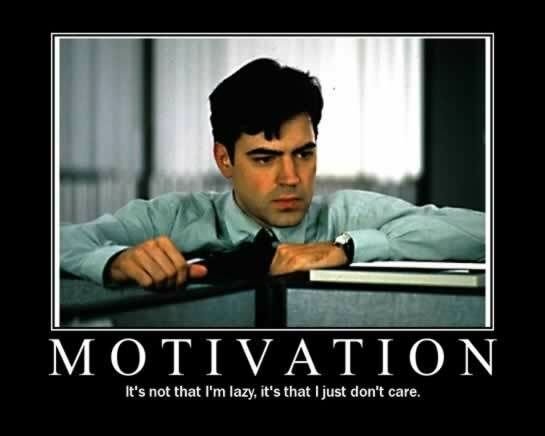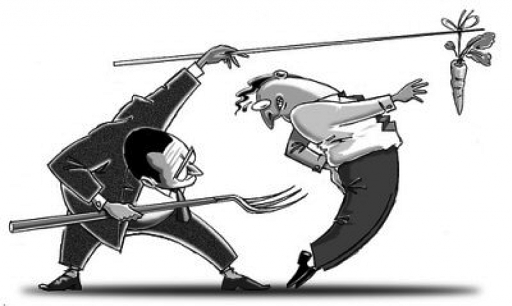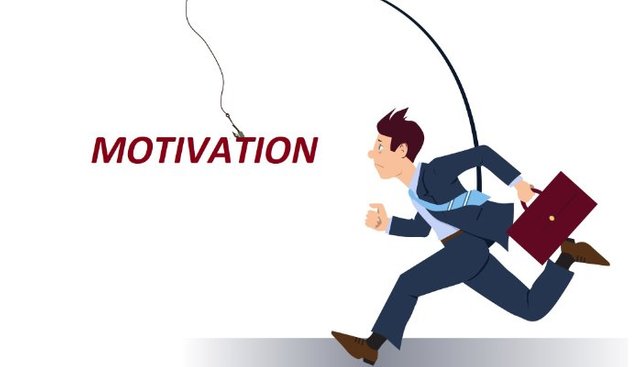Shooting Ourselves in the Foot by Leading with a Carrot
Many people, from employers to employees, believe in the extrinsic motivation of rewards to get people interested in something. This is despite evidence showing the opposite is true.

source, source
Many people think money is most important, or that other people think money is most important, so they try to lead people with a carrot to get them interested in doing something by getting money for it, not because they are interested in actually doing it.

source
A new study published in the journal Motivation Science on Jan. 16, says there is and enormous amount of empirical research that shows the harmful effects of extrinsic incentives (like money, competition prizes, rewards, etc.) on our intrinsic motivations. The extrinsic incentives undermine our intrinsic motivations, yet most people still believe the opposite is the reality. People think extrinsic incentives result in improved future performance, and this drives much of our behavior and way of life in society.
I refer to this as the real meaningful substance within us, that motivates us, being overridden by superficial appearances that play on baser instincts.
Past research has found that offering extrinsic incentives to motivate certain behavior, such as financial or other rewards, does lead to short-term improvements. However, those who receive the carrot to lead them to do something are often less interested in doing the task.

source
The money is only a temporary motivator, but not something that taps into the core of our values to motivate us. Many people in society operate this way with a focus on materialism and accumulating objects or cycling through them by always getting new things. None of this fills what is missing. It's only a false proxy that acts as a substitute and gives a temporary satisfaction. And people are motivated to continue in that behavior because it makes them feel good to have that satisfaction of getting something they desire. But it's not a deep core meaningful desire that is being fulfilled.
When someone isn't doing something, it's not simply that they are lazy. It could be that they just don't care about what they are "supposed" to do, like a task in order to get rewarded with a paycheck.

source
The intrinsic motivation that drives us (what we care or desire to do) matters in life. We can adopt new things to care about, and realize some things we care about are not good for us. We can change.
For the study, the researchers wanted to know how people think our intrinsic motivations are affected by extrinsic incentives. Participants are asked to judge if this benefited or was detrimental to recipients of extrinsic influence. They were given the description of a previous experiment which demonstrated the undermining effect of extrinsic incentives on intrinsic motivations. Then they were asked to make a prediction about the effect of the incentives on motivation of the recipients they were evaluating.
The majority of participants were firm and adamant about their predictions that they believed rewards had a beneficial effect on intrinsic motivations. Those who were wrong and believed the incentives help intrinsic motivation were wrong, but had more confidence that they were right than those who actually guessed right.
This is known to be wrong, as the results demonstrate, except people still believe this myth that extrinsic incentives actually helps our intrinsic motivation to do things. Our society is still reliant upon extrinsic incentives to motivate people to do things.
We still have an inaccurate belief about motivation that pervades as a frequent use in our society. The study suggests that stakeholders beliefs in continuing to promote this type of behavior is to be targeted as part of intervention research to get people to think differently.
Lead researcher and psychology professor for the study at University of Reading, Dr Kou Murayama said:
"Society has a deep-rooted misunderstanding of how motivation works, and employers are repeatedly shooting themselves in the foot with the frequent use of rewards to encourage certain behaviors or increase effort"

source
I've talked about this in the review of Steem/Steemit proposals for the next hardfork, and I mentioned it again in yesterdays post Solutions to Interactivity, Engagement and Comment Reward Problems. And now, there is this study that came out to again demonstrate this issue that I am talking about.
A new comment reward pool to cut the economy and rive people with extrinsic incentives is not going to resolve the issues, which I laid out in the previous post yesterday: lack of functionality to enable interconnectivity of content. Another reward pool is only going to drive bots to dominate it as well, not improve the interactivity on the site since the feature set is lacking to enable the level of interactivity people want! Create real solution, not flawed ones. If we want people to engage in the platform, we need tools, not extra rewards. Please read my post yesterday.
Murayama adds:
"Our work shows we need to correct our strong misbelief in a carrot and stick approach to achieve sustained motivation among workers."

source
You can get a child to behave temporarily, in the short term, but does doesn't motivate them to actually change their behavior to behave all the time. It just incentivizes and motivates them to engage in certain behavior in order to receive a reward, just like those who are addicted to shopping or attaining material things.
Rewarding people to study or work more doesn't function in the long term. It is leading them with the carrot for survival, with money as an immediate gain that is motivating them. The money is what motivates them. They don't have the intrinsic gain and desire to do it themselves. The incentive is continually required in order to reproduce the same behavior or else the false motivation is not induced because the true motivation is never actually there.

source
Rewards become the focus, not the task. Rewards become continuously desired in order to do a task, otherwise the task is not desirable to perform.
The study recognizes that rewards in our society are used to control the behaviors of others.
Money is a powerful incentive to get people to do things. There is even the belief, urban legend or maybe it's a reality, that some people would kill their grandmothers for money. Money has become so powerful in our worldview and sense of self, self-value and self-worth, and our evaluation of others, that money has supplanted the place of a "God", as an all-pervading force in our lives. Many people believe that without money nothing would be possible, that human life would not be possible.
We end up chasing a false motivator of money or rewards, instead of looking within to understand what really matters to motivate us to act towards that instead.

source
Instead of relying on rewards, respecting individual autonomy and understanding intrinsic motivation is an alternative strategy that could achieve better results. Creating and providing an environment that meets people's inner core motivational desires, such as wanting to receive and pay attention and connect with others, is what will improve satisfaction within that environment, community or organization.
Rather than the threat of the stick, or the reward of the carrot on a stick, there are better ways to understand why we do things and how to do something else or change and do something new.
Temporary compliance to engage in a behavior is not a motivation coming from within the person where they fuel themselves. More authentic, genuine, real, true motivational understanding can be developed by understanding what is going on.
Trying to get children to become more ethical and rational decision-makers is unlikely to be helped by punishment or threats to elicit temporary compliance. Anyone who has children probably knows how difficult that is. Whenever we think of consequences to our actions, or are told there will be, we often don't like it. We often want to do whatever we want. Facing possible consequence can engender anger, defiance or a desire for revenge. This applies to children and adults.
Instead of the power of punishment, some people turn to rewards in order to motivate changes in the behavior of others.
Inducing someone to learn or comply with demands or a request is not feeding deeper intrinsic desires or needs that would fuel the person to act on their own. Common practices in schools are to reward stickers and stars, A's and praises, and awards and privileges.
Instead of doing what motivates us, children and adults are being led down predetermined and preselected pathways to conform and promote the current condition and system of living. We get trained into certain categories of knowledge in our outcome-based education. We don't get taught how to really think for ourselves.
The carrot is not much more effective than stick to help people become more responsible and self-directed learners and achievers.
When rewards stop, people usually return to their previous behavior. The deep core motivation was never there. Once the falser proxy motivation is removed, there is no more motivation. Getting rewarded for something can lead to an expectation of getting those rewards, and possibly a sense of entitlement to continue receiving it.
Losing what we were getting ties into psychology of loss aversion, and also the endowment effect. We are willing to invest more to keep something that we own than to get something new. This applies psychologically in the rewards we get as well, since we don't want to lose those rewards. If we do lose them, it hurts more.
When we get rewards to get us to do something (not just as a bonus that we don't know is coming or expected), then we can develop the over-justification effect.
Expecting an external incentive (like money or other rewards like prizes), decreases the intrinsic motivation to perform a task.
A task that was done unrewarded and motivated internally, will be undermined with an external motivator to perform a function. If the external pseudo-motivator is not there, then it's gone and the prior intrinsic motivation doesn't return. Then the extrinsic rewards have to be repeatedly offered as a motivation to keep someone satisfied and maintain their activity.
The requirements to feed our emotional or cognitive commitments are not being met. The underlying behavior is never truly changed from within ourselves. Both punishment and rewards are trying to manipulate someone into certain behavior, rather than have them understand to need to do it.
Empowerment through understanding is much more substantive,meaningful and lasting to affect our behavior, than a simple carrot as reward or stick as punishment.
In punishment, the question we can ask ourselves is: “What do they want me to do, and what happens to me if I don’t do it?”
In rewards, the question we can ask ourselves is: “What do they want me to do, and what do I get for doing it?”
In either case, the motivation isn't coming from *why someone should really be doing something. A deeper, substantive, more meaningful reason to motivate ourselves to do something is missing when we are simply being led by a carrot to do something.
Doing something because we want to do it, means we are more likely to do it for itself.
Doing something for a reward primarily, means we are more likely to not want to do it when the reward is removed.
Those who do something for "nothing" in terms of a promised reward, will do it better than those who are doing something for something they are told they will be rewarded with.
Will rewards motivate people? Yes. Rewards will motivate people to get rewards.
Using rewards to motivate people will not motivate them to be interested in or excel at what they are doing. As you can tell, this ties into quality. Being interested in something and excelling at it, compared to others who aren't interested yet do it anyways, will promote more quality in general no matter what is being done.
Successes and failures in general can be seen as a learning experience, rather than something that has associated rewards of punishments for doing it (even though some actions do have serious consequences). Honest appreciation is different that reward behavior, as long as the vocal rewards of encouragement and praise aren't blindly given all the time to render them counter-productive or even meaningless.
When engagement is self-directed through our own internal intrinsic motivation, that is what will create lasting motivation to engage in something.
If the desired engagement can't be actualized, then motivation is stifled and is suppressed. When the freedom to create and interact with others is enhanced, engagement follows. When rewards are used to channel (manipulate, control) people into doing something, that freedom and autonomy gets restricted because now they are doing something specific based on a reward, not based on doing it for itself or a more meaningful reason or valuation. When real value and meaning are present, the rewards are not required, and are ultimately destructive in many ways.
On Steemit, people want to engage, like anywhere that there are groups or communities online. But without the functionality to permit engagement, the engagement is not going to happen when it's too difficult to do so. People who come to Steemit with the expectation of comparative social media integration for interaction with other community members, but don't get it, will feel let down, and couple that with this new model that they don't understand and feel lost in, they also feel disenfranchised.
People already want to engage here, but they lack the functionality to permit greater interactivity when new comments appear. There is no way to see them.
Leading people with a carrot to try to stimulate engagement with a separate reward pool is not the solution to get people to engage in comments. "Only 1% of rewards were paid to commenters" therefore "comment reward pool"... that's a flawed justification for trying to increase engagement through rewards. Facebook has engagement, not because of rewards, or because of bots that give people likes, but because there is the ability to connect with people in one place to interchange attention, thoughts, emotion and content as well.
Facebook can alert you when your friends comment somewhere else, or when a post you like gets commented on. There are many options for interconnectivity on the most popular social media sites that people now expect as part of their ability to interact. Anything less just doesn't cut it for many social users and they may feel "disconnected" as a result. Enabling people to connect will enable the engagement to follow.
Thank you for your time and attention! I appreciate the knowledge reaching more people. Take care. Peace.
References:
- Society remains convinced rewards work, despite evidence they decrease motivation
- People’s Naiveté About How Extrinsic Rewards Influence Intrinsic Motivation
- The Risks of Rewards
- How Rewards Can Backfire and Reduce Motivation
- Why Incentives Don't Actually Motivate People To Do Better Work
- Why Financial Incentives Don’t Improve Performance
- Reward and Incentive Programs are Ineffective -- Even Harmful
If you appreciate and value the content, please consider:
@krnel
2017-01-21, 12pm

Hello @krnel,
Congratulations! Your post has been chosen by the communities of SteemTrail as one of our top picks today.
Also, as a selection for being a top pick today, you have been awarded a TRAIL token for your participation on our innovative platform...STEEM.
Please visit SteemTrail to get instructions on how to claim your TRAIL token today.
If you wish to learn more about receiving additional TRAIL tokens and SteemTrail, stop by and chat with us.
If you choose not to receive any comments or TRAIL rewards from SteemTrail, you can reply with "Stop" to opt out. Thank you.
Happy TRAIL!

Unfortunately, many things (which employers need to have done) do not have an intrinsic motivator available. These studies (which I have been following over the years), all seem to assume that intrinsic motivations are available. Few jobs actually have those. The result, in a further misinterpretation of the studies, is a notion that handing out "Good Job" stickers is better than handing out raises.
The tie-in to Steemit is right on though. Probably a correct use of the actual data. The two ways to motivate people in Steemit are monetary and emotional. Both could use some correction. I believe a closer association between the term "STEEM" and the word "esteem" is required. The people who will make this a great platform are those who desire to be paid in esteem as much as in STEEM.
There is an intrinsic motivator if you like what you do, other than simply doing it for the money to survive. The problem with how we live our lives is why we have this flawed motivation to do things. Those few who do get to do what they like, have the motivation to excel, whereas those who have money to get a job done as the motivator might not excel so easily due to underlying motivation not being there. So the data is accurate when looked at properly. Of course intrinsic motivations are not automatically present in all work environments, as most of us don't engage in work-for-pay for underlying intrinsic motivations. Thank you for the feedback.
I agree, but I think we should engage in work-for-pay for things that have underlying intrinsic motivations for us. I understand people declining that too, but I think it works nicely when intrinsic and extrinsic motivations line up.
Yes they can indeed line up. That's what I said. Some people do have that, while others don't. This factors into how some people excel, because they care about what they are doing, whereas others mostly do it to get paid to survive.
Of course. But again, few jobs that employers want done have that. Or at least, for few people. Certainly there are some few folks who like cleaning out sewage lines, but not enough to clean all the sewage lines that need to be cleaned. The rest of those people should be incentivized with money, money that they need to fulfil their actual intrinsic motivators.
So it's not a matter of looking at it properly, I think I see it quite clearly, it's one of applying it to the proper range of endeavors. The popular interpretations do not do this. The data I've seen relates only to comparative motivations, not situations where only one motivation exists. That creates a false assumption for most people, that only direct intrinsic motivators work.
Yeah, not that only intrinsic works. But the underlying motivation for intrinsic is more powerful to get people to do things, and results in better performance and quality through excelling at it. Yeah, money can fulfill other desires or motivations, but its still needing to do something to get it that you might not care to do, like sewage as you say. So the underlying motivation is not there for that task itself is the point.
Valuing the task itself matters. If we just do it for money because we want the money for something else, either survival or another motivation, whatever, then it's not valuing the task itself as something one cares to do because it has value in being done. We can recognize cleaning sewage has value to society, but personally, it's not something we want to do, we just do it for X, Y, Z other reason as mentioned above.
That's what I mean by the data is ok, and we just need to look at it properly, which yes, the researchers can fail to present more accurately as you indicate. Thanks gain for the feedback :)
If people want to do it and like to do it then of course they'll become addicted to doing it. People don't get paid for what they like doing most of the time though. We have an intrinsic motivation to eat but very few people are professional food eaters.
In a world with basic income for all then you would be right. We would all have the luxury to focus on intrinsic motivation. In the real world we need money because we don't have time to play games all day with our friends.
THIS ^^^^
So one of the first things I can think of is...
1.private messaging
2.chat
Yup, in the aforementioned previous post on solutions, I mentioned some, like the comments tab, the notifications for "Watch" or "followed" posts that I opened a github request for. PMs, many people have requested that, I opened a github soon after joining steem for that as well.
The coming groups will help.
PMs and a way to access comments like a tab for new ones, along with notifications on posts, would be the top 3 for me so far that I can think of.
Technically this (PM) is already possible with memos, just costs $0.001
Well they are messages, but they aren't "private" hehe. What about a centralized messaging server built into the site? No one really cares (99.99% of people) if its in the blockchain, they just want to be able to message people. Thanks for the feedback.
If I study the API I bet I could write a PM mechanism which uses PGP or symmetric encryption. But the question is of usability and if it's too complicated for all but the people who already use PGP then it's not useful.
I wonder if building new functionality into the site is the optimal solution. We've decentralization spectre haunting the Europe... wait, E_WRONGFAIRYTALE, go back. Decentralization is a strong theme. PMs would greatly enhance functionality of the site, as would notifications and other things mentioned, done through some sort of User Center, which could be not part of the site, but... standalone application? Mobile application? Peer-to-peer?
Only the engagement of the establishment wealthy who don't need any money because they have plenty of it. For people who are in developing countries or who struggle in developed countries the money is the only thing making social media worth the time.
Because it costs money to make posts and dedicate the time.
I think they have more time than the most of the "wealthiest" of Western civilization ...
Do you mean life expectancy or do you mean free time? I think people have significantly less free time in the kind of fast paced capitalist environments. People miss their children growing up, miss time with their immediate families, for their jobs.
free time
There is no such thing as truly "free time" if you're not well off. All time you spend is an investment toward something, whether it is learning, or pursuing love, or pursuing entertainment, it is always an opportunity cost to invest the limited time you have in any specific thing.
If you have enough money where you don't have to barter with your time to survive then you have "free time" because you're already financially free. The truth is, people who seek financial freedom are motivated by freedom but money is a means to achieving the goal. So it's not that money is a direct motivator but it is an indirect motivator.
@dana-edwards If we would know that tomorrow we will die... what would we do with our freedom?
Well said as usual @krnel. I see the problem that you are pointing out. It seems that would be a problem for Steemit in general. I guess it is. I continue to believe that the solution to engagement and retention and quality content lies in having more of a consensus on what is rewarded instead of the only real power belonging to whales. Unfortunately, I don't see my idea for doing that working until reputation is not as easily gamed.
Yeah, I resteemed that post too. Rep doesn't mean much indeed.
Good post on the old question of life "To Have or To Be?" because according to this consumerist society To Have=To Be is the formula.
This a typical product of modernity and modernization, generated by the economic development "to HAVE", preventing the evolution "to BE", and people try to appear what they"Are not", but what they Have.
For me motivation is involvement. Involve people in the construction of the community world is the best reward.
That's what make people happy and free :)
Great comment again ;) Thanks for the feedback. Involvement yup, feel like you matter :)
Good stuff.
Much of our conditioning has to do with keeping up with the Joneses and impressing others. When these motivations are taken out of the equation, ultimately, we want to be productive. We want to make a difference. And when our "job" is only about the bottom line, our motivation can't really be anything internal unless we possess the character to do a great job for the reward of doing a great job.
Another aspect is that our first priority is to eat. Doing a job without some tangible reward will eventually leave us hungry. It is only after this need is met that we're able to more fully focus on the deeper rewards of our production. Even then, until we are confident where the next meal is coming from, our focus will continue to be on rewards to that end.
IOW, motivation is relative. There are too many factors to provide one static perspective.
The money comments are spot on too. Few stop to consider what money (used interchangeably with "currency" here) really is. It's merely a medium of exchange. If it's true money, then it's also a store of value. But that's another discussion. :)
When it comes down to it, the way someone views "success" will dictate their reward. The shallow successes of financial fortune are not bad, in and of themselves. But they can never be enough. If we think they are, then eventually the ends will justify the means, rather than the means being the more valuable reward.
I think I said basically the same thing you did, but from a different perspective and a slightly different emphasis. Thank you for the exercise. :)
Well written as always. I say try paying your rent with intrinsic rewards. I'm a firm believer in Occam's Razor...look for the simplest answer. We work because we have to. We do a good job because if we don't, someone else will and we get fired. The concept itself is sound, but difficult to apply to the workplace. It translates well to forums like Steemit, where satisfaction is a reward, more important than money, in my estimation. It also applies to child-rearing. I might break it down differently by applying a reward hierarchy split between tasks that we must perform and those we choose to perform. Just a thought.
LOL I'll pay my rent with my mind, I'll "secret" my way to wealth ;)
I indeed did good jobs because I care to represent myself as a certain level of quality worker, even if I didn't like what I was dong that much. Facebook has success where people feed off of the attention, appreciation, etc. When money gets involved that takes second place. Different types of tasks does indeed affect our motivation like you say. Thanks for the feedback.
Great post, @krnel. I've been meaning to read the book Punished by Rewards, by Alfie Kohn who talks about a lot of this same stuff. From what I've seen, rewards are most damaging when it comes to creative work, which is where most of our work is shifting to as a species. Factory work (i.e. non-creative, repetitive work) can actually function with a rewards-based system, but we've since learned that even in those situations, we need to be creative to notice potential areas of improvement.
I think you make a lot of good cases for why the rewards perspective on Steemit causes problems (I went through a time where I hid the $ signs to figure that out). I also think tools and such will improve things around here, but ultimately we have to provide more value than the current social media platforms do. All their friends are on Facebook, Twitter, Instagram, etc... why would they come to Steemit where none or very few of their friends are? What's social about that?
It's a chicken/egg problem and the other platforms have a huge head start. I'm thinking the real shift will happen if and when those other platforms screw up big. We're already starting to see some of this in regards to censorship and the use of ads.
Indeed, it has a greater affect in intrinsic factors, like when we create from a desire to do so, or excel fro a desire/care as well. Yeah well the other social medias got popular how? How did facebook get people over myspace? Features? Something else? I don't know... just wondering. I know that if you build functionality to allow people to connect, that is certainly a driving force to keep them here in additional to the rewards possibility given for putting out work. Thanks for the feedback.
In many ways, I think Facebook was lucky at the right place at the right time. Myspace was close, but the execution wasn't quite there and I think they may have even been a bit early. Is the network effect so big now that it can't be overcome? Maybe... but as it was with Facebook, if your entire university is there (I joined early on), then that's where you want to be also. Myspace didn't have that same draw. It also didn't have the same clarity of interface and functionality (IMO). But in today's competitive environment, I don't know if tooling and UI/UX will be enough. Maybe some rewards (or at least the concept of sharing value internally instead of involving advertisers and investors) might be a big draw which then leads to more intrinsic motivations to build community here instead of elsewhere. That seems to have worked for me, though many of the friends I've brought here either haven't posted yet, lost interest in posting, or lost their passwords (that, unfortunately, has happened too many times).
Been bringing up this issue many times. We don't the Steemit behavior on other social sites. We don't see how many dislikes or amount of money that post made(since they don't have that feature).
So when someone creates a posts on other sites, it's to share information and communicate it to an audience. The popularity is what is focused on other sites. To gain popularity, we communicate with others in the community.
It is similar on Steemit but when you include the monetary system with a social media site, the behavior will change because we know that without a doubt that there will be those that lie, steal, and kill for monetary gain and also clouds judgment in decision making.
That is one more awesome post from you. Keep em coming @krnel! I really enjoy what you're doing!